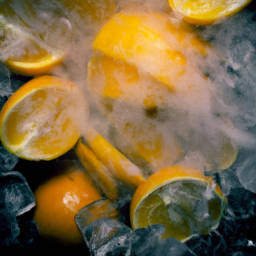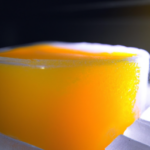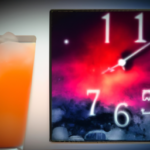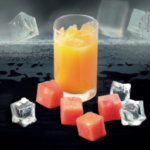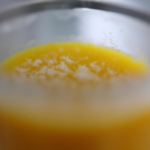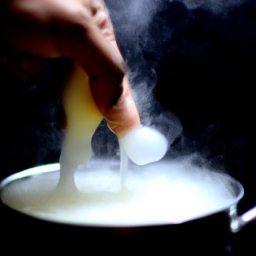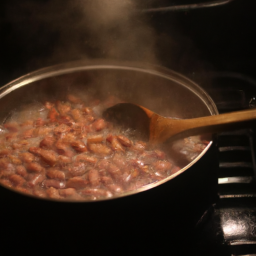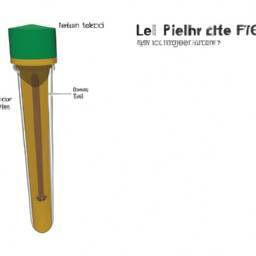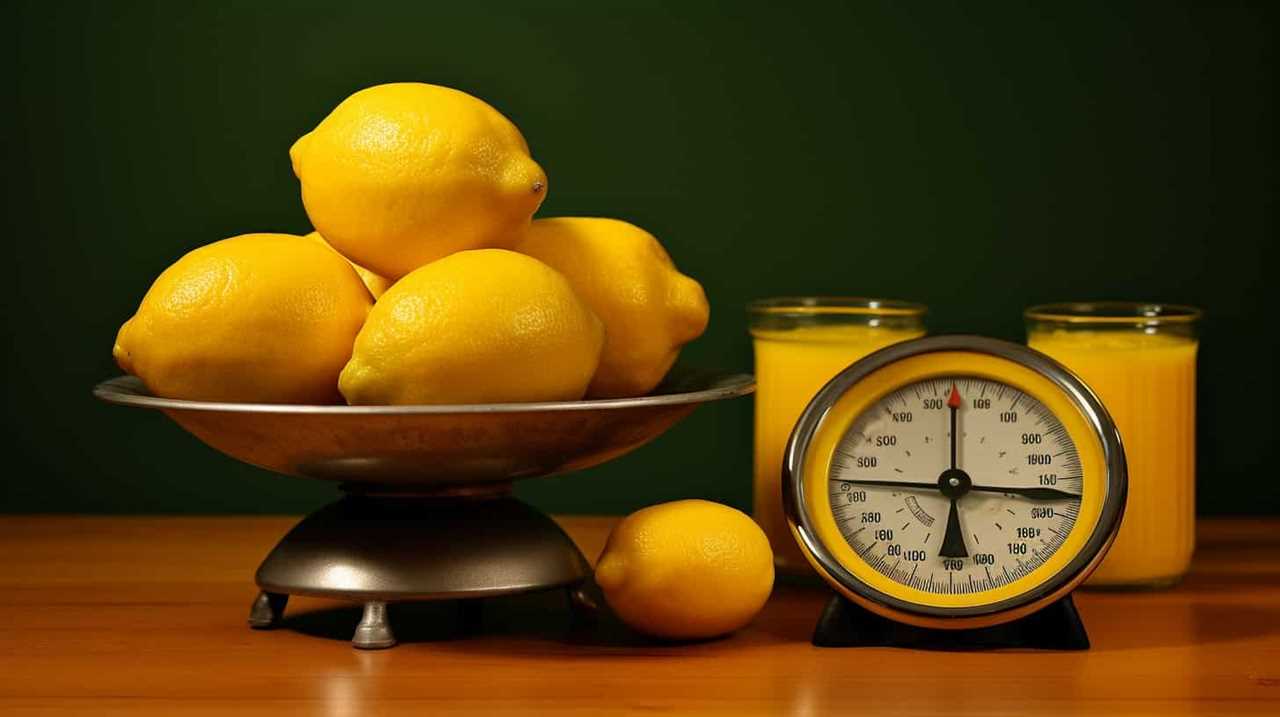When I first decided to freeze my favorite juice, I was unsure about how long it would take to freeze completely. After some research and experiments, I can now confidently say that I have a good understanding of the different freezing times for various types of juice.
There are several factors that can affect the freezing time of juice, such as the sugar content, acidity level, and temperature of the freezer. Additionally, some types of juice may freeze faster or slower than others due to their specific properties.
In this article, I will explore these factors and provide some tips on how to freeze juice effectively. Whether you’re looking to extend the shelf life of your juice or simply enjoy a refreshing frozen treat, understanding the freezing time of juice can be a helpful tool in your kitchen.
Key Takeaways
- Factors affecting freezing time of juice include sugar content, acidity level, and freezer temperature.
- Sugar content affects freezing time; higher sugar content means longer freezing time.
- Choosing the right container is important, and leaving space for expansion is crucial.
- Thawing techniques include warm water, microwave, or refrigerator, and thawed juice should be shaken or stirred before using.
Factors Affecting Freezing Time
Want your juice to freeze faster? Check out the factors that affect freezing time!
One of the main factors that affect the freezing time of juice is freezing point depression. This is the phenomenon where the freezing point of a liquid is lowered due to the presence of solutes such as sugar.
The more solutes present in the juice, the lower its freezing point becomes, and the longer it takes to freeze. Another factor that affects freezing time is the impact of sugar content on freezing time.
The higher the sugar content in the juice, the longer it takes to freeze. This is because sugar molecules interfere with the formation of ice crystals, which slows down the freezing process.
Therefore, if you want your juice to freeze quickly, it’s best to choose a juice with lower sugar content.
Now, let’s take a look at the types of juice and their freezing times.
Types of Juice and Their Freezing Times
You can almost taste the crispness of a freshly squeezed orange as you imagine the speed at which it solidifies when placed in the freezer. But did you know that the freezing points for different types of juice vary?
For instance, the freezing point for apple juice is around 27°F, while that of orange juice is around 24°F. This means that apple juice takes longer to freeze than orange juice. This difference in freezing points can influence storage and preservation methods for these beverages, especially when dealing with large quantities. The orange juice freezing time is shorter, making it a more convenient option for quick freezing in commercial settings. On the other hand, the longer freezing time of apple juice may require different handling procedures to maintain its quality during colder temperatures.
Factors affecting the quality of frozen juice include the sugar content, acidity, and temperature. The higher the sugar content, the lower the freezing point, and the lower the acidity, the higher the freezing point.
Additionally, if the temperature of the freezer is not set correctly, the juice may not freeze properly, resulting in a slushy consistency. To ensure the best quality frozen juice, it’s crucial to consider these factors and adjust the freezing time and temperature accordingly.
With these factors in mind, let’s move on to some tips for freezing juice.
Tips for Freezing Juice
When it comes to freezing juice, there are a few key things to keep in mind. First, it’s important to choose the right container – one that is freezer-safe and won’t crack under the extreme cold.
Second, you’ll want to prepare the juice properly – this may involve removing any pulp or seeds, or adding extra sweetener to help preserve the flavor.
Finally, when storing the juice in the freezer, be sure to leave enough room for it to expand as it freezes, and label the container with the date and type of juice for easy reference later on.
Choosing the Right Container
Picking the perfect container for your juice will prevent any potential spills or splatters when placing it in the freezer. When choosing the right container, there are a few things to consider.
Firstly, decide whether to use plastic or glass. While plastic containers are more lightweight and durable, glass containers are more eco-friendly and offer better insulation, keeping your juice colder for longer periods.
Secondly, consider the size options available and choose a container that will fit your juice quantity without leaving too much extra space, as this can cause freezer burn.
Thirdly, look for containers with tight-fitting lids to prevent air from entering and ice crystals from forming.
Finally, if using plastic containers, make sure they’re labeled as freezer-safe to avoid any potential damage.
After choosing the right container, it’s time to prepare the juice for freezing. Adding sugar can improve the consistency of the juice after it’s been frozen, making it smoother and less icy. To do this, dissolve sugar in the juice before pouring it into the container.
It’s also important to leave some space at the top of the container to allow for expansion as the juice freezes. Once the juice is ready, place the lid on tightly and store it in the freezer for the recommended time.
Preparing the Juice
To get your juice ready for the freezer, it’s essential to prepare it properly. Juice preparation involves adding sugar to improve the texture and taste. The amount of sugar you need depends on your preference, but it’s generally recommended to add about 1-2 tablespoons per cup of juice.
Mix the sugar with the juice until it dissolves entirely, and make sure to taste it before freezing to ensure it’s to your liking. Another important aspect of juice preparation is chilling techniques. It’s best to chill the juice in the refrigerator for a few hours before freezing to avoid temperature shock.
This will also help the juice to freeze faster and more evenly. Lastly, leave some space for expansion as the juice freezes. Pouring the juice into a container that’s too full can cause the container to burst, which will be messy and wasteful.
To move on to storing the juice in the freezer, you’ll need to make sure you have the right container.
Storing the Juice in the Freezer
Now it’s time to find the perfect container for your frozen juice, so you can keep it fresh for whenever you’re craving a sweet and icy treat. It’s important to choose a container that is freezer-safe and won’t crack or break when frozen.
Glass jars or plastic containers with tight-fitting lids work well for freezing juice. Make sure to leave some headspace in the container to allow for expansion as the juice freezes.
Before placing the container in the freezer, make sure the juice is at the proper temperature for freezing. The juice should be chilled to at least 40°F (4°C) before freezing. If the juice is too warm, it can take longer to freeze and may cause freezer burn.
Freezer burn can affect the texture and flavor of the juice, so it’s important to prevent it by storing the juice in an airtight container. Now that the juice is safely stored in the freezer, let’s move on to how to tell if your juice is frozen.
How to Tell If Your Juice Is Frozen
Have you ever opened your freezer to grab a frozen juice container, only to find it’s still in a liquid state? Here are some ways to tell if your juice is frozen or not:
-
Check the container: If your juice container has bulged or expanded, it’s likely that the juice has frozen and expanded in the process.
-
Shake the container: Give the container a good shake. If the juice moves around like a liquid, then it’s not frozen. If the juice is stuck to the sides of the container, it’s probably frozen.
-
Look for ice crystals: If you notice ice crystals forming in your juice, it’s a sure sign that it’s starting to freeze.
-
Use a thermometer: If you’re not sure if your juice is frozen, use a thermometer to check the temperature. Juice freezes at around 28 degrees Fahrenheit, so if your juice is below this temperature, it’s likely that it’s frozen.
When freezing juice, it’s important to prevent it from freezing in the fridge by storing it in the freezer. Frozen juice cubes can also be used as a healthier alternative to ice cubes in drinks.
Now that we know how to tell if our juice is frozen, let’s move on to the next step of thawing it out.
Thawing Frozen Juice
You’re in luck if you’ve got a frozen juice container because thawing it out is as easy as pie! There are several thawing techniques that you can use depending on how much time you have.
If you’re in a hurry, you can place the frozen juice container in a bowl of warm water. This will speed up the thawing process, but be sure to check the juice every few minutes and stir it to ensure that it thaws evenly. Another quick method is to microwave the frozen juice container for a few seconds, but be careful not to overdo it as this may cause the juice to become too hot.
If you have more time, you can simply place the frozen juice container in the refrigerator and let it thaw overnight. This is the safest and most effective method as it ensures that the juice thaws evenly and stays at a safe temperature.
Once the juice has thawed, be sure to give it a good shake or stir to ensure that it’s well mixed. Alternatively, you can use the frozen juice in creative ways such as adding it to smoothies, cocktails, or even as a marinade for meats. The possibilities are endless!
Using Frozen Juice
When it comes to using frozen juice, there are a few different options to consider. Personally, I like to use frozen juice to make homemade frozen treats like popsicles or sorbets. It’s also great for using in recipes like marinades or sauces.
And of course, you can always just drink the thawed juice as is. Overall, frozen juice is a versatile ingredient that can add flavor and convenience to any meal or snack.
Making Frozen Treats
To make delicious frozen treats, I always start by selecting my favorite fruits and juices. I love experimenting with creative flavor combinations, like blending pineapple juice with frozen strawberries or mixing orange juice with chopped mango.
Once I have my ingredients ready, I blend them together in a high-powered blender until smooth.
Next, I pour the mixture into homemade popsicle molds and freeze them for several hours until they’re fully set.
The result is a refreshing and healthy treat that’s perfect for hot summer days. Plus, making frozen treats at home allows me to control the ingredients and avoid any added sugars or artificial flavors.
Now that I have my frozen treats ready, I can’t wait to explore different ways to use them in recipes.
Using in Recipes
Don’t you just love it when you have leftover frozen treats to use in recipes? It’s like discovering a hidden treasure in your freezer.
One of my favorite ways to use frozen juice is in cocktails. Simply add a few scoops of frozen juice into a blender with some ice and your favorite alcohol, and you’ll have a refreshing and delicious frozen cocktail in no time.
Another great way to incorporate frozen juice into your cooking is by using it in baking recipes. You can add frozen juice to muffin and cake batters for a burst of flavor, or use it to make a glaze for pastries and breads. The possibilities are endless, and the convenience of having frozen juice on hand makes it an easy addition to any recipe.
With so many options for using frozen juice in cooking and baking, it’s a no-brainer to keep some in your freezer at all times.
Speaking of using thawed juice, let’s move on to the next section about drinking it.
Drinking Thawed Juice
Sipping on a chilled glass of freshly thawed, zesty citrus juice on a summer day is like taking a refreshing dip in a cool pool. However, it’s important to note that the flavor of thawed juice may change slightly. As juice freezes, the water content separates from the natural sugars and acids, causing a change in taste and texture. But don’t worry, the flavor changes are minimal and won’t affect the overall enjoyment of the juice.
To help you enjoy your thawed juice even more, here’s a table that outlines the recommended thawing times for different types of juice:
| Type of Juice | Thawing Time |
|---|---|
| Orange | 2-3 hours |
| Grapefruit | 3-4 hours |
| Lemon | 1-2 hours |
| Lime | 1-2 hours |
| Apple | 2-3 hours |
| Cranberry | 3-4 hours |
Now that we know how to properly thaw and drink juice, let’s move on to common problems and solutions.
Common Problems and Solutions
If you’re like me, you’ve probably had the frustrating experience of trying to freeze juice only to find that it’s taking way longer than expected. One common problem is the consistency of the juice. If the juice is too thick or has a lot of pulp, it may take longer to freeze. In this case, it’s best to strain the juice before freezing it. This will remove any pulp or particles that may be slowing down the freezing process.
Another common problem is the type of freezing equipment being used. If you’re using a regular home freezer, it’s important to make sure the temperature is set to the coldest setting. If you have a deep freezer, this will work even better. Also, make sure the juice is in a container that is suitable for freezing. Glass containers can break when frozen, so it’s best to use plastic or metal containers.
By addressing these common problems, you should be able to freeze your juice in a reasonable amount of time.
When it comes to storing your frozen juice, there are a few tips to keep in mind. For example, make sure the container is airtight to prevent freezer burn. It’s also a good idea to label the container with the date and type of juice. This will help you keep track of how long the juice has been frozen and avoid any confusion later on.
Juice Storage Tips
As someone who frequently freezes juice, I’ve learned a lot about the best practices for storing it.
When it comes to the shelf life of frozen juice, it’s important to know how long it will last before it starts to become less flavorful.
Additionally, I’ve discovered that not all types of juice freeze well, so it’s important to know whether or not you can freeze freshly squeezed juice, juice in glass containers, or juice with pulp.
Shelf Life of Frozen Juice
You’ll notice that the frozen juice in your freezer will last for several months, depending on the type of juice and how it was frozen. The shelf life of frozen juice can vary from three to twelve months, and it’s important to check the expiration date on the packaging before consuming it.
When it comes to storage options, it’s best to keep frozen juice in a tightly sealed container or freezer bag to prevent freezer burn. Freezer burn can affect the quality and taste of the juice, making it less enjoyable to drink. It’s also important to keep the temperature of the freezer at or below 0°F (-18°C) to ensure that the juice stays frozen and fresh for as long as possible.
With these tips in mind, you can enjoy your favorite frozen juice for months to come.
Transitioning into the subsequent section about ‘best practices for storing juice’, it’s important to note that proper storage is key to maintaining the quality and taste of your juice. By following these guidelines, you can ensure that your juice stays fresh and delicious for as long as possible.
Best Practices for Storing Juice
To keep your juice tasting fresh and vibrant, seal it in an airtight container and place it in the coldest part of your refrigerator, where it can stay crisp and invigorating until you’re ready to drink it. Here are some best practices for storing juice:
-
Keep the juice temperature between 32°F and 40°F to maintain its quality.
-
Avoid storing juice in the door of your fridge, as it’s subject to temperature fluctuations.
-
Use glass containers instead of plastic, as plastic can leach chemicals into the juice.
-
Label the container with the date you made the juice to ensure you consume it before it goes bad.
-
To prevent freezer burn, don’t freeze freshly squeezed juice.
Freezing juice can be a convenient way to preserve it for later consumption, but can’t freeze freshly squeezed juice? Let’s find out in the next section.
Can You Freeze Freshly Squeezed Juice?
In the previous subtopic, we discussed the best practices for storing juice. Now, let’s talk about one of the most common questions people have about juice storage: Can you freeze freshly squeezed juice? The answer is yes, you can freeze fresh juice, but it’s important to understand the benefits and drawbacks of doing so.
When you freeze fresh juice, you can preserve its nutrients and flavor for longer. This can be especially helpful if you have a surplus of juice that you can’t consume before it spoils. However, freezing can also cause some changes in the juice’s texture and flavor, so it’s important to follow best practices for preserving the juice’s quality. This includes using the right containers and thawing the juice properly. Let’s take a look at some of the benefits and drawbacks of freezing freshly squeezed juice in the table below.
| Benefits | Drawbacks |
|---|---|
| Preserves nutrients and flavor for longer | Can alter texture and flavor |
| Reduces waste | May require special containers |
| Convenient for future use | Thawing process can be time-consuming |
Now that we’ve discussed the benefits and drawbacks of freezing fresh juice, let’s move on to another important question: Can you freeze juice in glass containers?
Can You Freeze Juice in Glass Containers?
Freezing juice in glass containers may seem like a good idea, but there are some important factors to consider. Here are some pros and cons to help you decide if this method is right for you:
-
Pros:
-
Glass is a non-reactive material that won’t affect the flavor or quality of the juice.
-
Glass containers are easy to clean and reuse.
-
Cons:
-
Glass is fragile and can break during the freezing process.
-
The expansion of the juice during the freezing process can cause the glass to crack or break.
If you’re looking for alternatives to glass containers, consider using plastic or silicone containers that are specifically designed for freezing liquids. These materials are more flexible and less likely to break during the freezing process.
Now, let’s move on to the next section and discuss whether or not you can freeze juice with pulp.
Can You Freeze Juice with Pulp?
Hey, did you know that freezing juice with pulp could change the texture of your drink? As an AI language model, I can tell you that the freezing process could cause the pulp to separate from the juice, resulting in a gritty and unpleasant texture.
This is because the water in the juice expands when frozen, causing the pulp to separate and settle at the bottom of the container. To prevent this from happening, it’s recommended to strain the pulp from the juice before freezing.
This will ensure that the texture of your drink remains smooth and consistent. Alternatively, you can also opt to use a juicer that separates the pulp from the juice before freezing. By doing so, you can enjoy a refreshing and delicious glass of juice without any unwanted grittiness.
Frequently Asked Questions
Is it safe to freeze juice in its original container?
I wouldn’t recommend freezing juice in its original container due to the risk of the container cracking or bursting. It’s safer to transfer the juice to a freezer-safe container before freezing to avoid any potential safety hazards.
Can you freeze homemade juice that has no preservatives added?
Yes, I can freeze homemade juice that has no preservatives added. I would recommend transferring it to a freezer-safe container before freezing. When stored properly, preservative-free juice can be frozen for several months without compromising its quality.
How long does it take for juice with pulp to freeze compared to pulp-free juice?
Juice freezing time comparison between pulp and pulp-free depends on sugar content. Pulp slows down freezing time due to its insulating properties, while sugar lowers the freezing point. Allegorically, pulp is the blanket that keeps the juice warm, whereas sugar is the antifreeze that prevents it from solidifying quickly.
Can you freeze juice that has already been opened and partially consumed?
Yes, you can freeze opened and partially consumed juice. However, the juice quality after freezing may be impacted, resulting in a change in flavor. It is important to consume the frozen juice within a reasonable time frame.
Can you mix different types of juice together before freezing them?
Juice Mixing Tips: Experiment with flavor combinations by mixing different types of juice together before freezing them. Start with a small batch and adjust the ratios to your liking. Be creative and have fun!
Conclusion
In conclusion, freezing juice is a simple process that requires little effort and yields great results. The freezing time of juice depends on various factors such as the type of juice, the temperature of the freezer, and the container used for freezing.
However, with proper preparation and storage, juice can be frozen for a long period of time without losing its taste and nutritional value. To ensure the best results, it’s recommended to use airtight containers or freezer bags to store the juice.
Additionally, labeling the containers with the type of juice and the date of freezing can help keep track of the frozen juice and prevent confusion. By following these tips and guidelines, you can easily freeze and store your favorite juice for future use, anytime and anywhere.
Remember, frozen juice can be a convenient and delicious way to enjoy your juice all year round.
Cindy thoroughly researches juicing trends, techniques, and recipes to provide readers with practical advice and inspiration. Her writing style is accessible, engaging, and designed to make complex concepts easy to understand. Cindy’s dedication to promoting the advantages of juicing shines through her work, empowering readers to make positive changes in their lives through the simple act of juicing.

